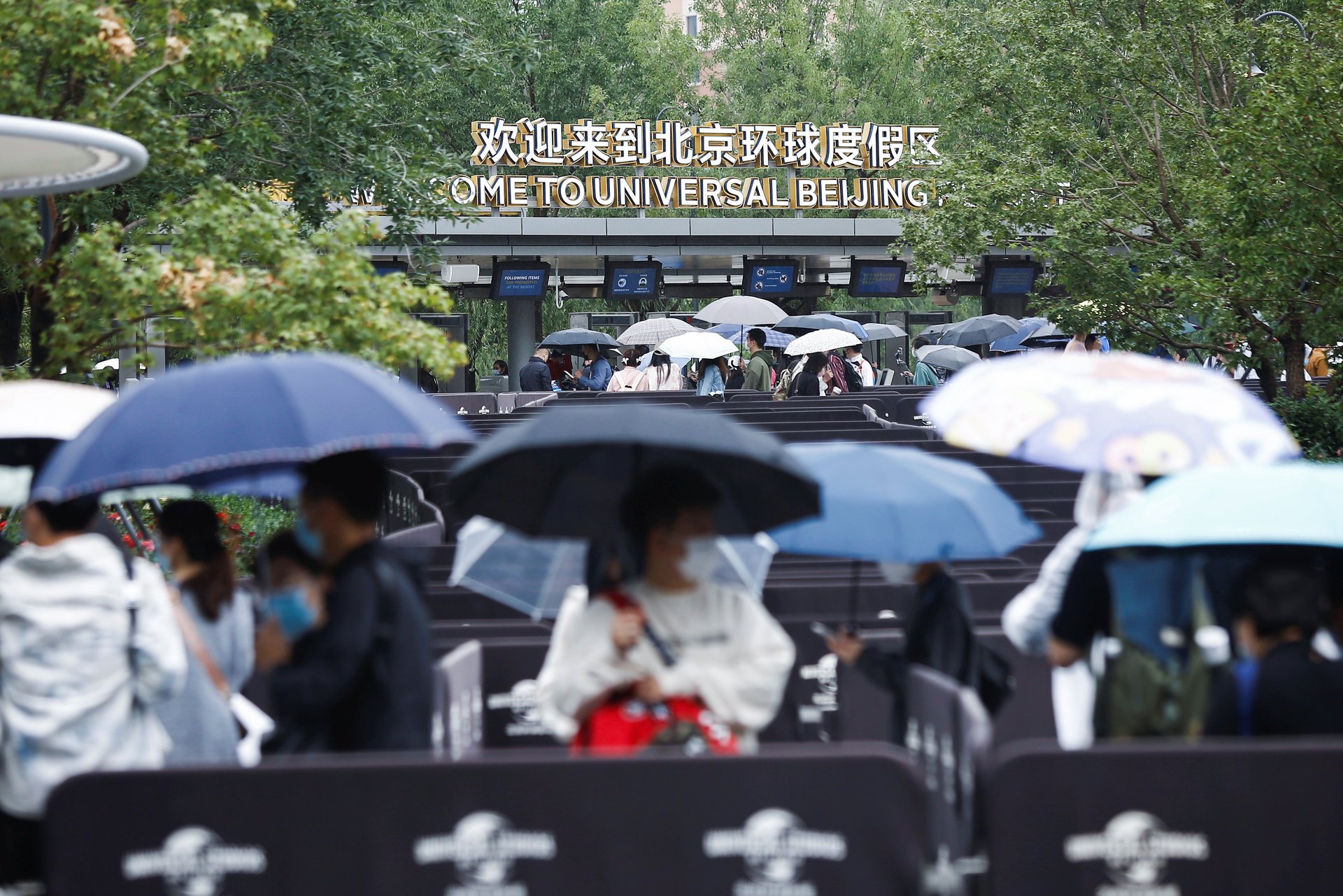Universal Studios’ new Beijing theme park shows Hollywood’s bet on China is paying off
Weeks before Universal Studios opened its long anticipated theme park in Beijing, it became clear that US-China tensions wouldn’t dampen its welcome.


Weeks before Universal Studios opened its long anticipated theme park in Beijing, it became clear that US-China tensions wouldn’t dampen its welcome.
Invitations to the park’s sneak peek on Sept. 1 quickly became a status symbol, with influencers who posted photos of themselves in Harry Potter gear at the park’s Hogwarts Castle prompting a slew of envious comments on social media platform Weibo. Then last week, $99 tickets to visit Universal Beijing Resort on its opening day today (Sept. 20), sold out within a minute of becoming available on Trip.com, one of China’s largest travel sites. Meanwhile Alibaba-backed travel site Fliggy sold 100,000 tickets within half an hour, while rooms at one of the park’s two hotels, some of which cost $3,000 per night, were also booked out as fast.
The overwhelming welcome is a reminder of the power of Hollywood, whose bet on the Chinese market appears to be paying off. And so is China’s bet on Hollywood.
A rollercoaster with a “soft landing”
The arrival of the park comes at a time when China and US have growing disputes in areas ranging from tech to Covid-19 origins, prompting rising Chinese nationalist sentiment that has fueled periodic boycotts of US companies. China has also been cracking down on its own movie celebrities in recent weeks yet official media has been surprisingly receptive to the theme park. That may have something to do with the park’s ownership structure.
The resort is majority owned by Chinese state companies including Beijing Shouhuan Cultural Tourism Investment, with the theme park unit of NBC Universal, part of US entertainment giant Comcast, owning 30%. That’s a similar model to the Shanghai Disneyland, which opened five years ago and is majority owned by Shanghai Shendi Group.
The fifth and largest Universal resort globally, the Beijing park was first proposed around 20 years ago by Beijing Tourism Group, according to China Daily, but approved only in 2014. It reportedly cost around $6.5 billion to build, and has sections dedicated to the Chinese audience including a Kung Fu Panda-themed zone apart from its usual attractions such as the Despicable Me Minion Mayhem-themed ride. It’s expected to receive 10 million visitors a year initially, which will grow as the park completes its expansion.
In a sign of Beijing diluting its aggressive “wolf warrior” diplomatic style around the park’s opening, many official voices in China hailed the Universal theme park as a sign of that goodwill remains between the two countries.
Qin Gang, the newly appointed Chinese ambassador to Washington, tweeted last week that he shared a rollercoaster ride at the park with friends from the US-China Business Council. “After all the tumbling and shakes, the rollercoaster came to a soft landing in the end,” he wrote. Meanwhile, state-owned Global Times said that the response to the Beijing park defied the “‘pervading anti-US nationalism’ in China portrayed by Western media.”
China’s hot-and-cold romance with Hollywood
Chinese audiences seem to have cooled to Hollywood movies themselves, with Chinese-made blockbusters and even indie flicks increasingly trumping US films at the box office.
Meanwhile, US movie studios’ engagement with China has caused criticism at home. Last year, Disney’s movie Mulan drew boycott calls after the production was found to have filmed in Xinjiang, and thanked public security officials in a region where an estimated 1 million Uyghur Muslims have been forcibly detained, a claim Beijing has denied.
But a large share of Hollywood revenues come from resorts and other experiences, which is why the sight of visitors chasing enthusiastically after characters like Megatron from the Transformers, who has become a social media phenomenon thanks to its chatty performer, and queuing up to get on rides at the Harry Potter-themed section, must be reassuring to entertainment company executives. The turnout is also a sign of consumer confidence in the Covid-19 recovery, with the resorts business hit hard last year.
Some Chinese internet users, however, said they were stunned by how easy Chinese people could move on from their previous boycotts of foreign brands, including US ones, over issues like Xinjiang and Hong Kong, where a political crackdown has been underway since last year.
“People really have no integrity at all, they, on one hand, chant anti-US slogans and on the other, crazily throwing money at it by flocking to the Universal park,” wrote a Weibo user.